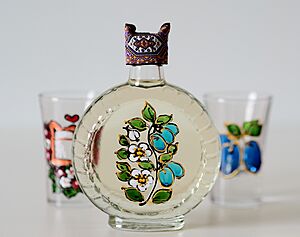Slivovitz facts for kids
Slivovitz is a special kind of fruit brandy or spirit made from damson plums. It's often called "plum spirit" or "plum brandy." People make Slivovitz in many parts of Central, Eastern, and Southern Europe. It's made both by companies and by individuals at home.
Contents
What is Slivovitz?
Slivovitz is a unique spirit created from plums. It's known by many names, including slivovitza, slivovitsa, șliboviță, šljivovica, śliwowica, Schlivowitz, slivovice, and slivovka. In some regions, like the Balkans, it's seen as a type of rakia. In Central Europe, it's similar to a pálinka.
Where Does it Come From?
Slivovitz is mainly produced in countries like Bosnia and Herzegovina, Bulgaria, Croatia, Czech Republic, Hungary, Poland, Romania, Serbia, and Slovakia. Other countries, including Greece, Italy, North Macedonia, Slovenia, and Ukraine, also produce it.
In 2007, the European Union decided that "slivovitz" could be a general name for this type of plum spirit. However, individual countries can also protect the name of their own specific version with an adjective, like "Serbian Slivovitz."
Similar plum spirits are also made in Austria, Canada, France, Germany, Switzerland, and the United States. They might be called "plum spirit," Pflümli, or eau-de-vie de quetsche.
How is Slivovitz Made?
Only Damson plums are used to make Slivovitz. First, the plums might be gently pressed to help them ferment faster. It's important not to damage the plum seeds inside. Sometimes, yeast, starch, or sugar is added to the plum juice.
The plum mixture then goes through a process called fermentation. After fermentation, the mixture is distilled. This means it's heated to separate the spirit. There might be one or more distillation steps. Many producers also age the spirit to improve its taste and make it smoother.
Some producers even get a special certification called a Hechsher. This means their Slivovitz is kosher for Passover, which is a Jewish holiday. During this festival, certain grain-based spirits are not allowed.
Some modern ways of making Slivovitz, like those used by Clear Creek in Oregon, don't use the plum pits during fermentation. This can make the spirit taste less bitter.
Sometimes, a spirit is made to imitate Slivovitz. This is done by adding prune juice and artificial oil of bitter almonds to other spirits.
The Name Slivovitz
The word slivovitz comes from an old Slavic word, *sliva, which means "plum." You can see this in words like Bulgarian: слива (Bulgarian), Czech: švestka (Czech), Polish: śliwka (Polish), and Slovak: slivka (Slovak). The ending -ica (or -ice in Czech) is a small suffix.
Many other fruit spirits have similar names. For example, in Czech, meruňka means "apricot," and meruňkovice means "apricot spirit." Also, broskev means "peach," and broskvovice means "peach spirit."
Different Names for Slivovitz
Slivovitz is known by different names depending on the country and language:
- Bulgarian: сливова, сливовица (Bulgarian)
- Czech: slivovice (Czech)
- Dutch: Slivovits (Dutch)
- German: Sliwowitz, Slibowitz (German)
- Hungarian: sligovica (Hungarian)
- Italian: slivovitz (Italian)
- Macedonian: сливова (Macedonian)
- Polish: śliwowica (Polish)
- Romanian: şliboviţă (Romanian)
- Russian: сливовица (Russian)
- Croatian: šljivovica (Croatian)
- Serbian: шљивовица (Serbian)
- Slovak: slivovica (Slovak)
- Slovene: slivovka (Slovenian)
- Ukrainian: слив'янка (Ukrainian)
- Yiddish: שליוואָוויץ (Yiddish)
See also
 In Spanish: Slivovitz para niños
In Spanish: Slivovitz para niños
 | Jewel Prestage |
 | Ella Baker |
 | Fannie Lou Hamer |


